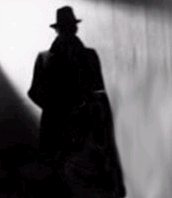In the comments section of my last post, Janet Rubin said:
Last night I watched the movie Mulholland Dr. I’m confused, perplexed, and disturbed. Does that mean it was good?
Why exactly Janet brought up Mulholland Drive when we were having such a great discussion about dog movies and gopher guts, I have no idea. Nevertheless, her question got me thinking and I figured I’d think out loud.
movies and gopher guts, I have no idea. Nevertheless, her question got me thinking and I figured I’d think out loud.
If you haven’t seen the movie, it is everything Janet said — confusing, perplexing, and disturbing. (And be forewarned, there is a very graphic sex sequence in this film.) It’s directed by David Lynch, an American filmmaker who’s known for surreal, highly stylistic, unconventional films. Mulholland Drive is no exception.
But Lynch’s work may be getting a bit too weird. Carina Chocano, staff writer for the LA Times, in her review of Lynch’s latest film, Inland Empire, writes
. . .clocking in at one merciful minute under three hours, Lynch’s much-anticipated follow-up to “Mulholland Drive” signals a hale swan-dive off the deep end, away from any pretense of narrative logic and into the purer realm of unconscious free association. . .
Lynch has talked about the freedom afforded him by video — shooting 40-minute takes, writing scenes moments before they are shot, following ideas into places they couldn’t have gone had complicated lighting set-ups been required. But the lack of structure and rigor doesn’t seem to serve him here, and the film, which begins promisingly, disappears down so many rabbit holes (one of them involving actual rabbits) that eventually it just disappears for good.
There’s a fine line between leading an audience and letting them think for themselves. There’s an equally fine line between ambiguity and incoherence. Lynch appears to have crossed that line, moving from the ingenious to the incomprehensible. (Thankfully, there’s sites like A Multi-Layered Analysis of Mulholland Dr. for the befuddled or bemused.)
But look at Janet’s query again: “. . .I’m confused, perplexed, and disturbed. Does that mean [the movie] was good?”
 Hmm. Good question.
Hmm. Good question.
Art interpre- tation is a subjective affair and the best art often yields up multiple meanings. A great test of any art — whether film, music, book, or watercolor — is if it stands up under multiple viewings. (Sorry, but seeing The Shooter once was enough.) Yet there’s a danger in assuming that ambiguity equals depth, that obscurity is artsy, that the more cultured a film is, the more brow-scrunching and head-scratching it will provoke. “I don’t know what it meant,” says the critic, stroking his goatee. “But, man, it was deep.” Uhhh. . .okay.
This happens in philosophy a lot. Remember the Eastern riddle, “What’s the sound of one hand clapping?” The question poses as profundity when, in reality, it is nonsense. Attention space cadets: One hand can’t clap! Likewise, ambiguity that results from meaninglessness is not profound, it is unanswerable.
But on the other hand, spelling everything out is less art and more lecture. It’s like listening to a sermon with your spouse, only to have them elbow you incessantly. Listen, I’m not called to be the Holy Spirit for my wife. His “elbowing” is much more timely and gentle than mine. Besides, some lessons are best learned when they are learned by experience. But, in the realm of art, that often means leaving the “interpretation” up to the viewer, which conjures its own set of problems. (And Christians are especially suspect when it comes to leaving their work up for interpretation.)
 In this sense, aesthetic ambiguity seems intrinsic to art. Deeper works will have multiple meanings. Of course, some folks like David Lynch will inevitably “swan-dive off the deep end,” clapping one hand all the way into absurdity. Others will end up sermonizing. Let’s just say, it’s the downside of double-meaning. But either way, artistic freedom means we tolerate both abuses.
In this sense, aesthetic ambiguity seems intrinsic to art. Deeper works will have multiple meanings. Of course, some folks like David Lynch will inevitably “swan-dive off the deep end,” clapping one hand all the way into absurdity. Others will end up sermonizing. Let’s just say, it’s the downside of double-meaning. But either way, artistic freedom means we tolerate both abuses.
Years ago, my Mom and I went to see the The Apostle. I left the theater and asked, “So was he a saint or a sinner?” To which she replied, “Does he have to be one or the other?” Touché. Alright, so I haven’t answered Janet’s question. But, in a way, is there one?














It’s sort of disgusting how talented you are. You really ought to be a columnist somewhere. I really enjoyed this thought-provoking post (no, not just because you quote me:)) I agree wholeheartedly with your musings. I think it is important for us as storytellers to remember to keep that balance, and as readers, not to be taken in by nonsense masquerading as something “deep.”
“Nonsense masquerading as deep.” Nicely put.
At any rate…I think you answered your own question with another question. Was The Apostle a saint or a sinner? I saw the movie. In the end, he was both.
This is really just an annoyingly long comment intended to say “well said.” 0=)
Given that I am the 38th most brilliant person in the free world (56th overall), this is one of my pet peeves.
Often when a movie doesn’t have the goods, they seem to edit in ambiguity on purpose. Probably by editing out scenes that would have filled in some blanks. They are purposefully playing into a character fault common amongst the species called humans — the inability to admit that they don’t understand something.
A close cousin of this phenomenon is what I call sophistication by association. This is a condition common amongst people who claim to favor Sting’s solo career to that of the Police. Or they latch onto the newest oscar nominees or the latest “it” novel.
They don’t know what great is so they jump on the bandwagon. This explains why Eric Clapton is considered a great guitarist. And why 40 yr old white men listen to “la vida loca”
If this comment doesn’t make sense, it’s not my fault. It’s just too deep for you. No forced abiguity here.
– dayle
You could be a pro columnist. And congrats on the bloggy design award. What I first noticed many moon ago when I first discovered DECOMPOSE was how very cool it LOOKED. Then I noticed how very cool it READ. 🙂
Mulholland Drive was artistic crap. It looked interesting. It had a haunted feel. It had that mysterious blue box. It had gratuitous lesbian sex (othere was no fricken reason for it except to show one incredibly gorgeous and one very attractive woman doing it). It had a gratuitous masturbation scene. And it had a whole lot of…HuH?
Lynch needs an enema of the brain. The Transcendental Meditation has messed up his wiring. But, hey, at least he’s doing his own very weird thing.
Mir
I just wanted to go on the record and say that, despite the graphic sex and disturbing stuff, I LIKED the film. It sucked me right in, really made me think. I thought it was a good picture of mental illness. Wouldn’t want to watch it again and I think I would have liked it if it was a LITTLE easier to understand, but yeah, I liked it.